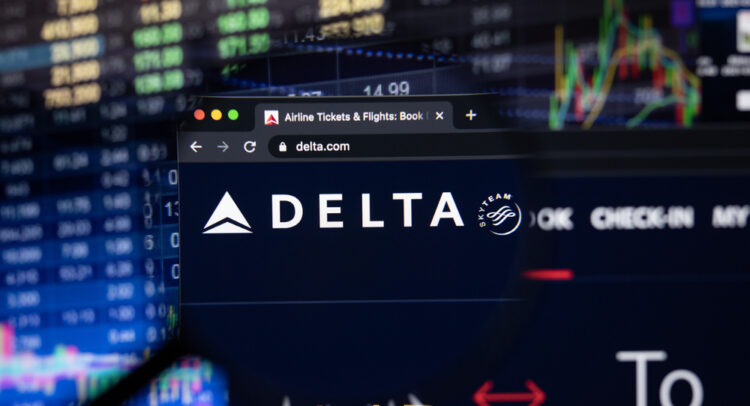Delta Air Lines (NYSE:DAL) stock has gained over the past 12 months but continues to trade at a discount — around 13% — to its pre-pandemic price. Looking forward, the Atlanta-based company looks like it could benefit from loosening monetary policy, and this is reflected in some strong earnings forecasts. The airline also provides rare shelter in the U.S. from Boeing (NYSE:BA) delays, and this is why I’m bullish on Detla. It seems like DAL stock is still undervalued.
Don't Miss Our Christmas Offers:
- Discover the latest stocks recommended by top Wall Street analysts, all in one place with Analyst Top Stocks
- Make smarter investments with weekly expert stock picks from the Smart Investor Newsletter
Delta’s Demand Tailwinds
Delta impressed investors with its Q1 showing, delivering $13.75 billion in revenue, beating consensus by $890 million, and registering earnings per share (EPS) of $0.45, above the consensus of $0.37. This actually represented the fourth consecutive earnings beat for Delta. That’s always a good sign.
Dan Janki, Delta’s chief financial officer, said that growth was normalizing following a period of strong post-pandemic demand and that the company was looking to optimize operations, with a focus on restoring profitable core hubs and delivering efficiency gains. Janki added that non-fuel unit costs were expected to increase by just 2% in the quarter to June.
Looking forward, analysts have pointed to loosening monetary policy as being a significant tailwind. Loosening monetary policy could significantly benefit Delta Air Lines through mechanisms that improve discretionary spending while easing the company’s debt burden. Despite the rate cut expectation falling from 75 to 25 basis points in 2024, the Federal Reserve is expected to deliver more rate cuts into 2026 as inflation largely appears to be under control.
Lower interest rates would reduce Delta’s hefty interest expenses, which were $205 million in Q1 2024 on $614 million operating income, and $812 million annually. Total debt and finance leasing obligations stood at $19.4 billion at the end of the quarter. Much of this debt stems from the pandemic. Janki said that Delta was aiming to repay at least $4 billion this year and improve leverage. Its efforts in Q1 had earned positive outlooks from Moody’s and Fitch.
Does Delta Have a Boeing Problem?
Several airlines have faced delivery delays due to Boeing’s troubles. Following pressure from airlines, passengers, and the authorities, Boeing is reworking as many as 50 aircraft due to issues like mis-drilled holes discovered in fuselages. Regulators have also placed a production cap on Boeing until it works through its quality assurance issues.
Boeing’s problems are not just impacting companies in the near term. Delta has said that it expects its order of 100 Max 10 planes could be delayed to 2027. It had expected to start receiving the aircraft in 2025. Delta also has an option to purchase an additional 30 Max 10 planes.
However, Delta is a rare shelter from Boeing’s challenges in the U.S. The company does not operate any Boeing 737 Max jets at this moment in time — and these are the ones in the spotlight. Moreover, management says that Airbus (OTC:EADSF) deliveries will fill the void left by the expected late delivery of the Max 10 jets. By comparison, United Airlines (NYSE:UAL) has asked some of its pilots to take unpaid time off because of the plane shortage.
Currently, Delta Air Lines’ fleet is nearly evenly split between Boeing and Airbus aircraft, with a slight preference for Boeing, especially among larger and long-haul aircraft like the 757 and 767. The Airbus fleet, however, is growing with modern additions like the A220, A330neo, and A350.
What Does the Forecast Say about Delta?
Delta’s earnings forecast is positive. Consensus estimates suggest earnings per share of $6.62 in 2024, rising to $7.62 in 2025, $8.65 in 2026, and then $10.28 in 2027. However, it’s worth noting that just two analysts have provided their projections for 2027, compared with 12 in 2026.
This earnings forecast implies a CAGR of 8.35% over the medium term — the next three to five years. In turn, taking into account the non-GAAP forward price-to-earnings (P/E) ratio of 7.17x, gives us a price-to-earnings-to-growth (PEG) ratio of 0.84. I’d certainly suggest this is an attractive metric.
Is Delta Stock a Buy, According to Analysts?
On TipRanks, DAL comes in as a Strong Buy based on 17 Buys, zero Holds, and zero Sell ratings assigned by analysts in the past three months. The average Delta Air Lines stock price target is $60.93, implying a 28.44% upside potential.

The Bottom Line On Delta Stock
Delta stock trades at a significant discount to its average price target and its earnings metrics are very positive. Slow fuel price growth and the potential for loosening monetary policy also represent strong tailwinds that should continue to drive the business forward in the near and medium term.
Moreover, Delta appears to be less impacted by Boeing’s production issues than its peers in the U.S., and management suggests that Airbus deliveries should mitigate any challenges emanating from Boeing exposure. I believe there’s plenty to be positive about with Delta, and I remain bullish.



















